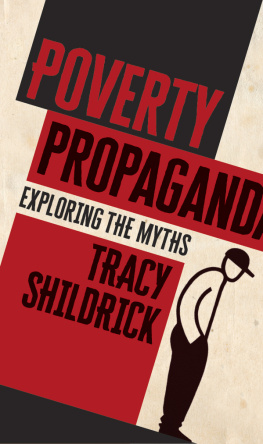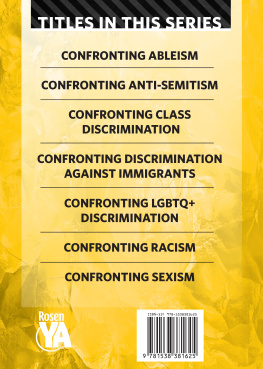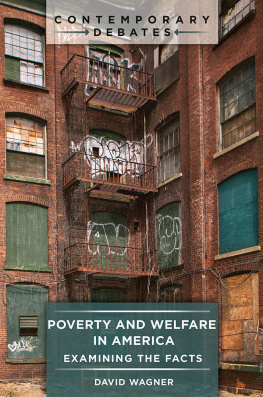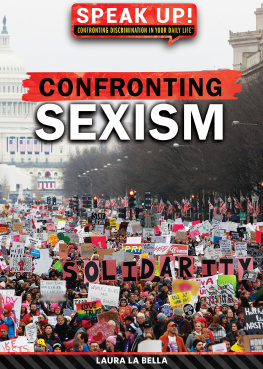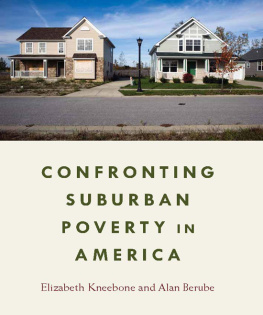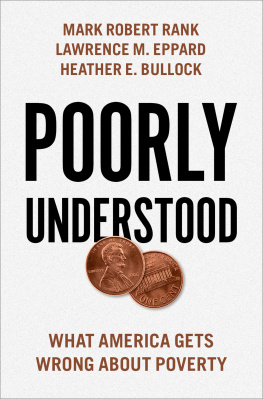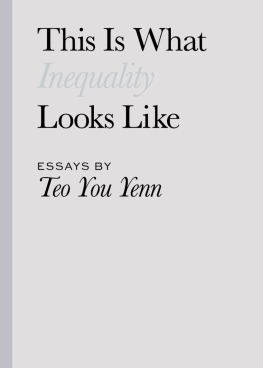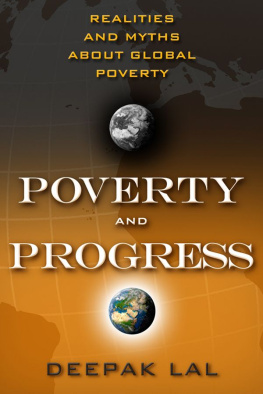Shildrick - Poverty propaganda: confronting the myths
Here you can read online Shildrick - Poverty propaganda: confronting the myths full text of the book (entire story) in english for free. Download pdf and epub, get meaning, cover and reviews about this ebook. City: Great Britain, year: 2017;2018, publisher: Policy Press, genre: Politics. Description of the work, (preface) as well as reviews are available. Best literature library LitArk.com created for fans of good reading and offers a wide selection of genres:
Romance novel
Science fiction
Adventure
Detective
Science
History
Home and family
Prose
Art
Politics
Computer
Non-fiction
Religion
Business
Children
Humor
Choose a favorite category and find really read worthwhile books. Enjoy immersion in the world of imagination, feel the emotions of the characters or learn something new for yourself, make an fascinating discovery.
Poverty propaganda: confronting the myths: summary, description and annotation
We offer to read an annotation, description, summary or preface (depends on what the author of the book "Poverty propaganda: confronting the myths" wrote himself). If you haven't found the necessary information about the book — write in the comments, we will try to find it.
Shildrick: author's other books
Who wrote Poverty propaganda: confronting the myths? Find out the surname, the name of the author of the book and a list of all author's works by series.
Poverty propaganda: confronting the myths — read online for free the complete book (whole text) full work
Below is the text of the book, divided by pages. System saving the place of the last page read, allows you to conveniently read the book "Poverty propaganda: confronting the myths" online for free, without having to search again every time where you left off. Put a bookmark, and you can go to the page where you finished reading at any time.
Font size:
Interval:
Bookmark:
POVERTY PROPAGANDA
Exploring the myths
Tracy Shildrick

First published in Great Britain in 2018 by
Policy Press University of Bristol 1-9 Old Park Hill Bristol BS2 8BB UK Tel +44 (0)117 954 5940 e-mail
North American office: Policy Press c/o The University of Chicago Press 1427 East 60th Street Chicago, IL 60637, USA t: +1 773 702 7700 f: +1 773-702-9756 e:
Policy Press 2018
British Library Cataloguing in Publication DataA catalogue record for this book is available from the British Library
Library of Congress Cataloging-in-Publication DataA catalog record for this book has been requested
ISBN 978-1-4473-2398-3 paperback
ISBN 978-1-4473-2397-6 hardcover
ISBN 978-1-4473-2401-0 ePub
ISBN 978-1-4473-2402-7 Mobi
ISBN 978-1-4473-2400-3 ePdf
The right of Tracy Shildrick to be identified as author of this work has been asserted by her in accordance with the Copyright, Designs and Patents Act 1988.
All rights reserved: no part of this publication may be reproduced, stored in a retrieval system, or transmitted in any form or by any means, electronic, mechanical, photocopying, recording, or otherwise without the prior permission of Policy Press.
The statements and opinions contained within this publication are solely those of the author and not of the University of Bristol or Policy Press. The University of Bristol and Policy Press disclaim responsibility for any injury to persons or property resulting from any material published in this publication.
Policy Press works to counter discrimination on grounds of gender, race, disability, age and sexuality.
Cover design by Lyn Davies
Reader's Guide
This book has been optimised for PDA.
Tables may have been presented to accommodate this devices' limitations.
Image presentation is limited by this device's limitations.
| CPAG | Child Poverty Action Group |
| DfE | Department for Education |
| DWP | Department for Work and Pensions |
| EHRC | Equality and Human Rights Commission |
| EU | European Union |
| IFS | Institute for Fiscal Studies |
| JRF | Joseph Rowntree Foundation |
| JSA | Jobseeker's Allowance |
| NHS | National Health Service |
| ONS | Office for National Statistics |
| TUC | Trades Union Congress |
In writing this book I owe various debts of gratitude to family, friends and colleagues who have all been supportive in different ways. Robert MacDonald, the late Andy Furlong, Colin Webster, Kayleigh Garthwaite, Johann Roden and Robert Crow were all co-researchers on the various research projects referred to in the book. The research participants in all of those projects deserve a special mention for sharing their lives with such honesty and generosity. Particular thanks go to Anqi Shen and also to Ruth Patrick, Pauline Ramshaw, Louise Wattis, Anthony Ruddy and Georgios Papanicoloau. The occasional meet-ups really helped but we really ought to try and do it more often! Robert Crow at Teesside remained a loyal and reliable supporter of the work and his ability to find sometimes obscure material never ceased to amaze me. Sharon Elley at Leeds was generous with her careful proof-reading skills. Adrian Sinfield has provided no end of valuable source material as well as commenting on various ideas and drafts of the book. He and his wife, Dorothy, have supported the research in lots of different ways over recent years and I feel incredibly privileged to have benefited from their immense knowledge, kindness and hospitality. Policy Press has been endlessly patient and tolerant and particular thanks go to Ali Shaw who continued to believe in me and in the value of the book, even when I occasionally didn't! The ideas benefited enormously from the debates I had with my level three Leeds SSP undergraduate students studying the 'Class in Everyday Life' module in early 2017. Most importantly, my family have continued to support and believe in me. Looking back, it is hard to believe that my daughters, Jessica and Chelsea, were just babies when I embarked on my undergraduate degree as a mature student at Teesside University. They have grown into two exceptional young women who continue to indulge my 'poverty passion' with both patience and grace, and I will forever be enormously proud of them both. Finally, my husband Steve never stopped believing in my ability to complete the book and he has generously tolerated my (very) many evening and weekend absences with love and little complaint. I owe a lot to people who have supported me, but of course, the book and any flaws in it are all my own.
The issue of people moving repeatedly between work and unemployment is an endemic problem in the UK and has risen by 60 per cent since 2006, mostly as a result of the recession. Entering work cannot provide a sustainable route out of poverty if job security, low pay and lack of progression are not also addressed. (Goulden, 2010, p 1)
Evidence shows that poverty, and the insecurity that inevitably accompanies it, is affecting the lives of more and more ordinary working-age people and families, not just in Britain and the UK more broadly but also across the globe (Standing, 2010; 2014; 2016). Poverty has become a normalised aspect of day-to-day life for millions of individuals and families in Britain today, yet it occupies a peculiar and contradictory position in both popular and political debates. Poverty is widespread in Britain, as well as in the UK more broadly, and all indications show that its incidence, particularly for children and working-age households, will continue to rise under the current direction of policy (Hood and Waters, 2017). Poverty in Britain is most often caused by 'poor work' (Byrne, 2005) that is, work that fails to take people away from poverty either for long enough or far enough to make a difference to their lives and by inadequate 'welfare', particularly for those forced to rely on out-of-work benefits (JRF, 2016). More and more people find themselves trapped between the two as they cycle in and out of short-term, low-paid work and on and off inadequate (and increasingly difficult to access) 'welfare' payments. Yet the low-pay, no-pay cycle, as it is often referred to, still remains a relative blind spot in political and policy debates. Since 2010, cuts forced through in the name of austerity have also added to the problem, although the general trends towards increasing inequality and diminishing opportunities for those who are economically marginalised go back much further than the recession of 2008 and the subsequent imposition of numerous cuts. Yet, despite the widespread existence of poverty in Britain, it is all too frequently ignored, increasingly demonised and, when it is discussed, almost always presented in ways that are misleading and inaccurate. As a result, poverty both as a concept and as a condition, is generally misunderstood and it is this misunderstanding and misrepresentation that this book aims to address.
This book argues that poverty propaganda deliberately and often very carefully crafted myths and misrepresentations about poverty and those who experience the condition has the biggest influence on how poverty is understood in the contemporary context. Poverty propaganda works to ensure that myths and false pronouncements about poverty and its causes and consequences are disseminated widely: thus poverty is at one and the same time both increasingly a normalised condition in contemporary Britain and also one that is demonised to such as degree that its real causes and consequences are barely discussed. Such is the strength of stigma and shame that comes from this misrepresentation that even those experiencing deep poverty and related disadvantages do everything they can to distance themselves from the condition (Shildrick and MacDonald, 2013). One of the reasons why poverty propaganda is so successful is not simply its ability to disguise poverty but its capacity to stigmatise not just those people who are experiencing poverty, but whole swathes of often very loosely defined segments of society who are in some way disadvantaged. It is precisely this woolliness in the target populations of poverty propaganda that makes its messages so powerful and that ensures that poverty as a condition can continue to be largely overlooked. Neoliberal regimes, such as that which has dominated in Britain since the mid-1970s, provide fertile ground for poverty propaganda to flourish as life chances are increasingly presented as and largely understood to be the sole responsibility of individuals (Beck, 2002). Neoliberal capitalist regimes are predicated on the promotion of widespread improvements in living conditions and the increasing availability of opportunities for personal and economic advancement. The language of the day might change, but the British equivalent of the 'American dream', whether it be in the form of the 'the opportunity society' (Major, 1991) or the latest incarnation in the form of 'The Great Meritocracy' (May, 2017), holds a special place in the British public's psyche and does much to help overshadow the gross and growing inequalities in access to opportunities that blight the lives and potential of increasing numbers of people.
Next pageFont size:
Interval:
Bookmark:
Similar books «Poverty propaganda: confronting the myths»
Look at similar books to Poverty propaganda: confronting the myths. We have selected literature similar in name and meaning in the hope of providing readers with more options to find new, interesting, not yet read works.
Discussion, reviews of the book Poverty propaganda: confronting the myths and just readers' own opinions. Leave your comments, write what you think about the work, its meaning or the main characters. Specify what exactly you liked and what you didn't like, and why you think so.

